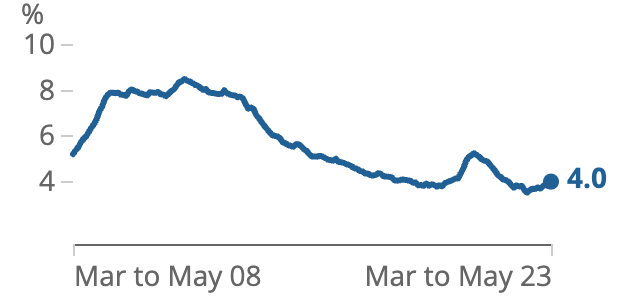Hello everyone and welcome to the latest Off to Lunch…
The jobs market in the UK is weakening according to new data out today.
The number of permanent staff appointments has fallen at the fastest rate since June 2020 and the number of people looking for work has risen by the most since October 2009, apart from December 2020 and a blip during the Covid-19 crisis, according to data from accountancy firm KPMG and the Recruitment and Employment Confederation, the trade body for the recruitment industry.
The KPMG and REC survey is based on replies from 400 recruitment and employment consultancies across the UK.
Meanwhile, PageGroup, the FTSE 250 recruitment company, has warned of “challenging conditions” and posted a 45 per cent drop in pre-tax profits for the first half of 2023 to £63.3 million.
Nicholas Kirk, chief executive of PageGroup, said the company had seen “lower levels of both candidate and client confidence resulting in delays in decision-making and candidates being more reluctant to accept offers”. PageGroup reduced its own workforce by 448, or 5 per cent, to 8,572 during the period.
You can find PageGroup’s results here and the KPMG and REC report here
Neil Carberry, chief executive of REC, said:
“The jobs market overall remains fairly robust, with vacancies and pay still rising and unemployment low but there is a sense in today’s report that the economy will need some growth soon to sustain this positive picture. Permanent hiring has been slowing all year. To some extent this is normalisation as the post-pandemic boom abates – but it is also driven by uncertainty.”
The UK labour market has been strong despite the economic uncertainty, with many industries, such as hospitality, still struggling to find staff. The unemployment rate stands at 4 per cent, which is low by recent standards, as this graph from the Office for National Statistics shows…
David Smith, economics editor of The Sunday Times, wrote about the jobs market in his latest column at the weekend. He said that news of 250 job cuts by Marshalls, the building materials group, had caught his attention last week, adding:
“The unusual circumstances of the past year or so, when there have been not enough workers to go round, will be replaced by the more familiar position of slack in the labour market — which, after all, is one of the things higher rates are intended to achieve.
“It does not mean a return to the very high unemployment of the past. Demographic factors, higher inactivity due to ill-health and a change in the nature of immigration will ensure that. It should mean, in time, that the Bank will stop worrying so much about pay.”
You can read that piece in full here
In other news on the UK economy today, LSL Property Services, which provides mortgage surveys and valuations through e.surv, has issued a profit warning. The company said in a stock market statement that profits for the year will now be “substantially lower than previously expected”. It added:
“The larger than expected increase in the Bank of England base rate announced in June has had a material impact on the mortgage market, reducing the level of purchase and remortgage activity and increasing further the proportion of product transfer business (where customers stay with their existing lender on completion of their mortgage scheme).”
The number of requests from lenders to carry out surveys in recent weeks is down by half compared to last year, LSL said.
Shares in the company have fallen 13 per cent following the statement, which you can find here
Other stories that matter…
1. The head of public affairs at HSBC has apologised after accusing the US of forcing the UK to cut back business dealings with China and saying the UK government had been “weak” over the issue. Sherard Cowper-Coles made the remarks at a private event and has told Bloomberg they were “personal comments” that don’t reflect the views of HSBC. Bloomberg story here
2. The UK exports 80 per cent of its oil because refineries in this country are not designed to deal with the higher levels of sulphur in North Sea oil. That is according to a great explainer on the practicalities of oil from Sky News’s Ed Conway here. Another fact in the piece is that the US is actually not energy independent because it needs refineries in other countries to prepare its crude oils for use. Sticking with oil, companies in the industry are finding it hard to hire young staff due to concerns about climate change and job security. Wall Street Journal story here
3. The New Yorker has reposted an article written by the American comedian and actor Steve Martin on how he learned how to be funny and eventually became successful. It is a story with many setbacks and one that those trying to grow their own business will recognise. As Ernest Hemingway said: “Gradually, then suddenly.” Piece here
4. A fascinating piece on darts by The New York Times and why players are getting better generation-by-generation. The analysis looks at darts but other sports too, citing better technology, a larger pool of players and improved training. Scientists are unsure about whether there is a limit on how good athletes can become. Piece here
5. For a round-up of the news in the Sunday papers, including FTSE 100 remuneration, the latest on debanking and a potential banking merger, check-out our Sunday press review. This was sent to paying subscribers on Sunday and you can find it here
Podcast…
A reminder that the latest episode of Business Studies features an interview with Richard Price, the managing director for clothing and home at Marks & Spencer, on how to revive a business that was once the market leader but had fallen behind younger rivals. You can listen to the episode on Substack here, Apple here and Spotify here
Our next episode is out on Tuesday morning and will be sent directly to all Off to Lunch subscribers…
And finally…
England are through to the quarter-finals of the women’s World Cup after a nerve-wracking penalty shootout victory over Nigeria. Quite the way to start the week. It did not look good when Lauren James got sent-off, leaving England down to ten players when they were already struggling.
They will play their quarter-final on Saturday morning at 11.30 against Columbia or Jamaica, with many of the other favourites already out. When James got sent-off there were plenty of comparisons on social media with David Beckham getting a red card against Argentina in the same stage of the men’s competition in 1998. But the men went on to lose that match on penalties…
Thanks for reading. If you enjoy Off to Lunch then please share it with others and spread the word. If this newsletter was shared with you then please sign-up below to become a member, get Off to Lunch sent directly to your inbox, and contribute to the work of Off to Lunch
Best
Graham









